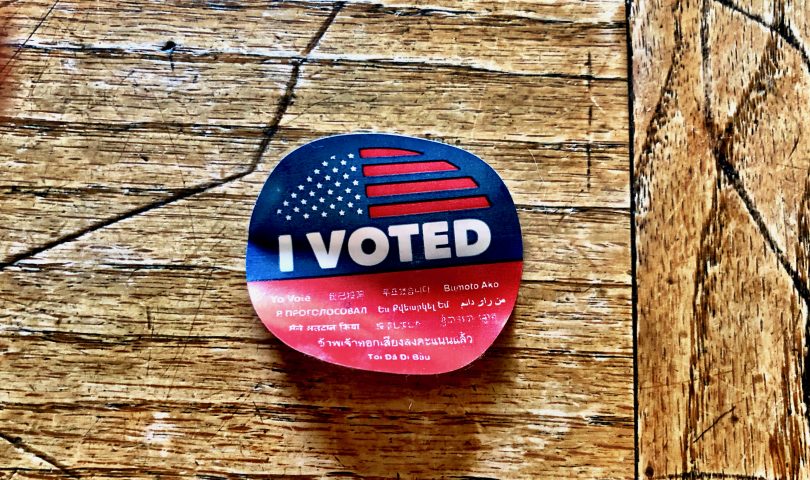by Matt Vasilogambros of Stateline, an initiative of The Pew Charitable Trusts
When Clifton Gibson was released from prison in 2019, he still felt the same disconnection from society that he internalized for the 25 years of his incarceration.
Among the many challenges he faced: He wasn’t allowed to vote. At that time, California, like several other states, did not allow people on parole with felony convictions to cast a ballot.
That changed in November, when Golden State voters passed Proposition 17 and restored the voting rights of 50,000 Californians released from prison with felony convictions.
“There was this restoration of who I was as a whole human being,” said Gibson, who lives in Los Angeles. “To be able to have a value to offer my community, my family and me; to be able to stand up for things that I believe in; and to have a voice in the process of things that I believe in and are important to my community.”
Building off two decades of advocacy work and the recent national push to overhaul the criminal justice system, 20 states now restore voting rights for people with felony convictions when they leave prison. Energy around the restoration of voting rights continues to swell. But there remains sustained opposition, as critics insist people with felony convictions pay all fines and serve the entirety of their parole before regaining the right to vote.
New York and Washington enacted laws in the past two months that automatically restore voting rights to people convicted of felonies after they are released from prison. Virginia Gov. Ralph Northam, a Democrat, signed an executive order in March that restored voting rights for more than 69,000 eligible Virginians.
A proposed amendment to the Virginia state constitution could make that change permanent. The legislature passed the amendment this session. Lawmakers will have to pass it again in 2022 before it heads to voters for final approval.
A holdover from the 19th century, 5.2 million Americans are disenfranchised because of their felony convictions—some 2.3% of the nation’s voting age population, according to a 2020 count by the Sentencing Project, a Washington, D.C.-based organization that lobbies for the restoration of voting rights. In 11 states, people with felony convictions lose their voting rights indefinitely, sometimes having to wait for a gubernatorial pardon, or navigate a gauntlet of waiting periods, fees and petitions.
Some critics of these new laws say people with felony convictions should serve the entirety of their sentences, including parole, probation and fines, before being able to cast a ballot again. However, proponents of voting rights restoration after prison think accessing the ballot connects people with society, giving them ownership over their lives and the community, and possibly dissuading them from committing crimes in the future.
“If you’re living your life on parole, you’re leading a law-abiding life,” said Democratic Assembly member Daniel O’Donnell, the New York bill’s sponsor. “If you’re leading a law-abiding life, you should be able to vote.”
Certain states are going beyond reinstating voting rights for those with felony convictions once they leave prison. Some are scrapping laws that disenfranchise those voters in the first place.
In Oregon, lawmakers are debating measures that would amend a law that strips voting rights from people with felony convictions. The District of Columbia, Maine and Vermont do not disenfranchise those with felony convictions even while in prison. Illinois also is debating legislation that would repeal the state’s ban on voting by incarcerated people.
The restoration of voting rights has drawn some bipartisan support. Last year, Iowa Gov. Kim Reynolds, a Republican, signed an executive order giving the right to vote to thousands of residents with felony convictions after completing parole or probation. The legislature is working to amend the state’s constitution to make this change permanent.
In Kentucky, Republican state Rep. Jason Nemes is one of the co-sponsors of bipartisan legislation that would amend the state constitution to automatically restore voting rights for people with certain felony convictions after they complete their imprisonment, probation or parole. Denying them the right to vote, he said, can make people attempting to rejoin society feel ostracized.
“When someone has committed an offense against the community and they served their time, we want that person back in the community,” he told Stateline. “Now it’s time for you to take a sense of ownership and responsibility for your neighbors.”
If the measure gets legislative approval, the proposed amendment will go before voters on the November 2022 ballot.
This proposal comes more than a year after Democratic Gov. Andy Beshear signed an executive order in 2019 that restored voting rights to an estimated 140,000 Kentuckians with nonviolent felony convictions who have completed their sentences. A Mason-Dixon Polling & Strategy poll released in February shows more than two-thirds of Kentuckianssupport the automatic restoration of voting rights for people who finished their sentences.
But there is still opposition by many lawmakers around the country, most of them Republican, who say that some crimes are so heinous they merit lasting punishment such as disenfranchisement. Others say that people with felony convictions should complete probation and parole periods, along with paying all fines, before they get their rights restored.
“Beyond voting rights, first comes responsibility,” said Washington state Rep. Jenny Graham, a Republican, during floor debate in February. “When somebody makes a decision to harm or kill another individual, there is accountability that is due.”
After Florida voters passed a ballot initiative restoring voting rights to people convicted of felonies after they leave prison, Republican lawmakers, led by Gov. Ron DeSantis, rolled the measure partially back, insisting that people pay all fines before getting their rights returned. This caused widespread confusion for many people who were formerly incarcerated, leaving them unsure whether they could vote in November’s presidential election.
The Florida confusion illustrated the ongoing hurdles for voting rights activists: Once these laws are enacted, hurdles remain. For example, informing recently released residents about their voting rights often falls on resource-limited community organizations, said Nicole Porter, director of advocacy at the Sentencing Project.
She thinks states should lead public education campaigns in prisons and in government offices, such as the department of motor vehicles or state health care offices.
“It has been baked into the culture that people with felonies cannot vote, even though laws differ state-to-state,” Porter said. “It would benefit the electorate and would improve voter participation and engagement if that was a responsibility that state officials would take on and make widely known.”
Lawmakers in Maryland this year introduced legislation that would require prison staff to provide voter registration information upon residents’ release from prison. It passed both houses of the Maryland legislature, though the chambers must now reconcile differences between their bills. Such requirements are part of New York’s recent law.
Local jails in Cook County, Illinois; Washington, D.C.; Los Angeles; and Philadelphia have implemented programs in recent years to inform incarcerated people of their voting rights and encourage voter registration, Porter said.
Too often on the campaign trail, O’Donnell said, he has heard his New York constituents say that if they served any time in jail, they don’t have the right to vote. He wants to correct misinformation and what he said is decades of injustice.
“Our nation has a horrible history of depriving the poor and people of color the right to vote,” he said, “and I want to change that.”
This story was originally published in Stateline, an initiative of The Pew Charitable Trusts. All Stateline stories are licensed under a Creative Commons Attribution-Noncommercial-NoDerivatives 4.0 International License ( CC-BY-NC-ND 4.0).
Top image via WitnessLA


